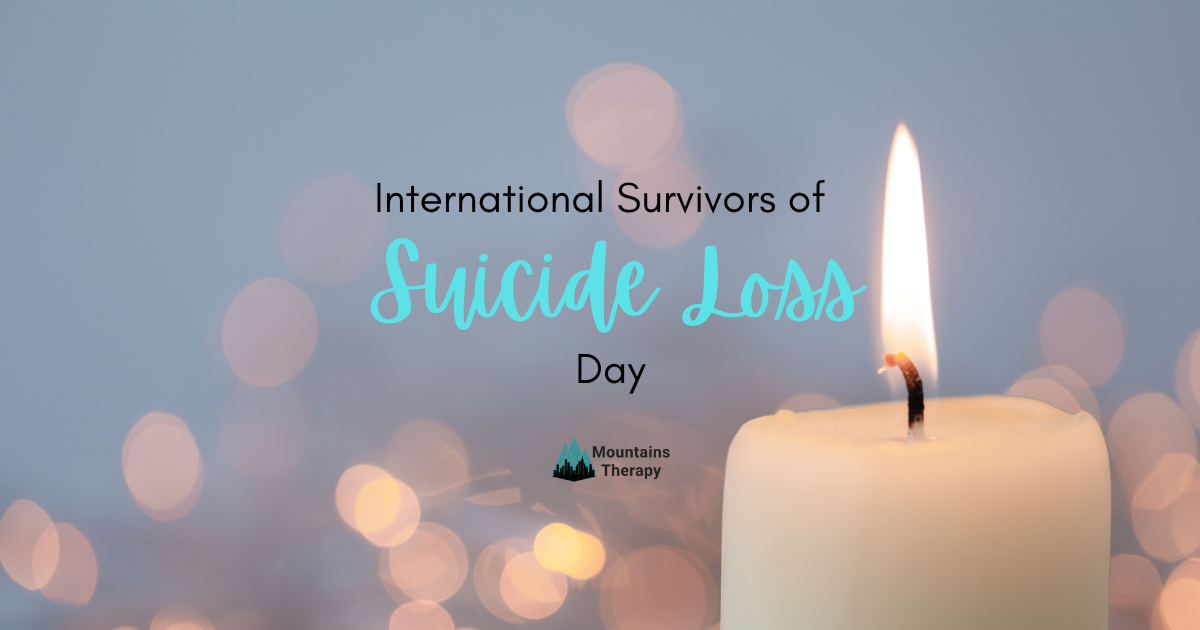How To Cope with Suicide Loss: Finding Support, Healing, and Hope
💜🩵
Learn more about therapy treatment in NJ, NC, FL & UT
In This Blog You’ll Learn
• What suicide loss is and why it feels different
• Signs you may need more support
• How suicide loss affects families
• Helpful coping strategies
• Therapy options that support healing
• Common myths and FAQs survivors often have
What Is Suicide Loss?
Suicide loss is one of the most emotionally complex and life altering experiences a person can face. Survivors often experience complicated grief, traumatic grief, sudden loss, shock, emotional numbness, and intrusive thoughts that feel overwhelming to manage alone. Many people begin looking for wellness therapy, a therapy studio that feels grounding, or in person therapy to receive trauma informed support during this deeply painful time.
Healing from suicide bereavement does not follow a timeline. It requires compassion, space, connection, and a therapy practice that understands the unique layers of losing someone to suicide.
International Survivors of Suicide Loss Day
International Survivors of Suicide Loss Day is a national day of healing for anyone who has lost a loved one to suicide. It takes place every year on the Saturday before Thanksgiving and brings people together from around the world to share stories, honor those they’ve lost, and connect with others who truly understand the unique pain of suicide bereavement.
This time of year can feel especially lonely for many survivors, and this day serves as a gentle reminder that you are not alone and that support is available. Whether you attend an in person gathering, join a virtual event, or simply take a quiet moment to reflect, International Survivors of Suicide Loss Day offers a compassionate space to grieve, remember, and feel supported by a community of people who understand what you’re going through.
Signs You May Need Extra Support After Suicide Loss
• Persistent overwhelming grief
• Shock and disbelief that does not lessen
• Guilt after suicide loss or regret and unanswered questions
• Anger and confusion toward the situation or toward your loved one
• Difficulty functioning at home, work, or school
• Isolation or pulling away from others
• Sleep disturbances, nightmares, or panic
• Feeling lost, emotionally numb, or deeply sad
• Struggling with family grieving suicide
• Supporting a child after suicide loss and feeling unsure what to say
• Teen grief after suicide loss that feels too heavy to navigate
Why Suicide Grief Feels Different
Many people search for answers like "why suicide grief feels different" or "how to cope with suicide grief." Suicide bereavement often involves traumatic grief, sudden loss, unanswered questions, and the painful search for meaning. It is common for survivors of suicide loss to feel guilt, anger, and emotional confusion, even years later.
Family Dynamics After Suicide Loss
Suicide loss impacts every member of a family differently.
Supporting a child after suicide loss: Children need age appropriate explanations, emotional validation, and safety.
Partner grieving suicide: Romantic partners often feel guilt, anger, or deep sadness.
Sibling grieving suicide: Siblings may feel invisible in the grieving process or carry unanswered questions.
Teen grief after suicide loss: Teens often experience emotional numbness, anger, or fear of future loss.
Family grieving suicide: Families benefit from shared rituals, open conversation, and guided support.
Coping Strategies for Suicide Loss
• Join support groups for suicide loss
• Use apps for managing grief after suicide loss
• Visit suicide loss forums with active online communities
• Try guided meditation apps that support the nervous system
• Read books on coping with suicide loss recommended by therapists
• Create small rituals to honor your loved one
• Attend local workshops on healing after suicide loss
• Explore online memorial services for those lost to suicide
• Seek suicide grief therapy or suicide loss counseling
• Reach out to community support for suicide loss, including spiritual, cultural, and peer resources
Therapy Options for Suicide Loss at Mountains Therapy
Mountains Therapy provides trauma informed, compassionate support for survivors of suicide loss. We offer online therapy across New Jersey, North Carolina, Florida, and Utah, with a waiting list for in person therapy. We support adults, teens, families, people searching for therapy men or men's therapists near me, women seeking therapy for woman, LGBTQIA individuals, and anyone needing emotional support after traumatic loss.
How Therapy Helps With Suicide Loss
Our therapists integrate evidence based and compassionate care, including:
Acceptance and Commitment Therapy (ACT)
- ACT is a highly effective approach in suicide loss therapy and grief counseling, helping you cope with painful emotions, manage intrusive thoughts, and build resilience after traumatic loss.
- Attachment Based Therapy supports survivors of suicide loss by addressing relationship wounds, attachment trauma, and the emotional impact of sudden loss, helping you rebuild safety and connection.
Cognitive Behavioral Therapy (CBT)
- CBT is widely used in traumatic grief treatment to reduce guilt, regret, and intrusive thoughts that follow suicide loss. It helps you challenge painful thinking patterns and regain emotional stability.
Dialectical Behavior Therapy (DBT)
- DBT provides essential skills for emotional regulation, grounding, and distress tolerance, making it especially helpful for survivors overwhelmed by intense emotions or traumatic grief responses.
Emotionally Focused Therapy (EFT)
- EFT supports couples and families grieving a suicide by strengthening emotional bonds, improving communication, and helping loved ones reconnect through shared loss.
Gottman Method Couples Therapy
- Gottman Method helps partners navigating suicide loss repair communication, rebuild trust, and address emotional distance created by grief and trauma.
- Mindfulness Based Therapy uses grounding, breathwork, and presence to help survivors calm anxiety, reduce emotional numbness, and steady the nervous system after traumatic loss.
- Narrative Therapy helps you reshape your story, make meaning after suicide loss, and honor your loved one while reclaiming identity and emotional clarity.
- Psychodynamic Therapy explores deeper emotions, relational trauma, and unresolved grief patterns that influence your healing after suicide loss.
Solution Focused Therapy (SFT)
- SFT offers practical, short term coping tools that support immediate stabilization and help you manage the day to day impact of suicide loss.
Trauma Focused Cognitive Behavioral Therapy (TF CBT)
- TF CBT is a leading approach for traumatic grief, helping survivors process shock, sudden loss, intrusive thoughts, and trauma symptoms related to suicide bereavement.
Myths and Facts About Suicide Loss
- Myth: You should be able to move on quickly.
Fact: Suicide loss takes time, tenderness, and trauma informed grief support. There is no timeline. - Myth: Talking about your loved one will make grief worse.
Fact: Sharing memories, emotions, and questions can help with coping with suicide loss and healing through connection. - Myth: Complicated grief is a sign of weakness.
Fact: Grieving a suicide often creates traumatic grief responses that need support, not judgment.
FAQs
- What is the best therapy for suicide loss?
Most people benefit from trauma informed grief therapy that integrates emotional support, grounding, and meaning making. - How long does suicide bereavement last?
There is no timeline. Healing happens in layers and is different for everyone. - Are support groups effective?
Yes. Community helps survivors of suicide loss feel less alone and reduces shame. - Is suicide grief considered traumatic grief?
Often, yes. Sudden loss, shock, and unanswered questions can create traumatic grief responses. - What resources are available if I need immediate or ongoing support after suicide loss?
Many people search for support groups for suicide loss survivors near me or best online counseling services for suicide loss grief. Both options can provide connection, validation, and access to trauma informed care. - Where can I find helpful tools like books, apps, and online guidance?
Survivors often look for books on coping with suicide loss recommended by therapists, apps for managing grief after suicide loss, or websites with resources for families after suicide loss. These tools can offer comfort, education, and emotional grounding throughout your healing journey. - How do I find specialized support such as hotlines, retreats, or grief coaches?
Many individuals want to know how to find a suicide loss support hotline in the US or organizations offering suicide loss survivor retreats. Others search for how to book a grief coach specializing in suicide loss for individualized guidance. - Are there online communities I can join?
Yes. Many survivors connect with suicide loss forums with active online communities, top rated grief counseling platforms for suicide loss, and mental health platforms offering group therapy for suicide loss. These spaces help reduce isolation and provide a sense of shared understanding. - What if I want local or community based support?
People often search for where to find local workshops on healing after suicide loss or how to start a suicide loss support group in my community. Both options create opportunities for in person connection and shared healing. - Are there additional supportive resources I can access?
Many survivors explore donation options to suicide loss prevention and support charities, recommended podcasts about healing from suicide loss, online memorial services for those lost to suicide, or how to subscribe to newsletters about suicide loss recovery. These options help people stay connected, informed, and emotionally supported. - How can I learn more about suicide loss grief as a survivor or professional?
Some people look for educational courses on suicide loss for counselors and survivors or virtual events focused on suicide loss healing and awareness. These resources offer deeper insight into traumatic grief and healing pathways. - What practical tools can help me at home?
Survivors often search for how to order self help workbooks for suicide loss grief or apps that connect suicide loss survivors with peer support to use between sessions or during difficult moments. - Where can I find real stories or shared experiences?
Many people want to read best online platforms for suicide loss survivor testimonials to feel less alone and better understand the shared human experience of suicide bereavement.
Start Therapy Today!
You deserve care that respects your identity and supports your wellbeing. If you are grieving a suicide loss and need gentle, trauma informed support, we are here for you. Mountains Therapy provided.
in person therapy in NJ and
online therapy
for clients in New Jersey, North Carolina, Florida, and Utah with compassionate, LGBTQIA2S affirming care.
Start your healing journey today and book an appointment!














